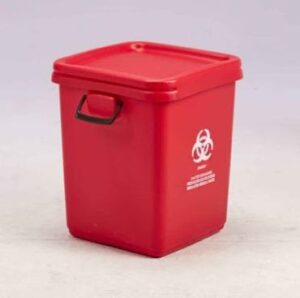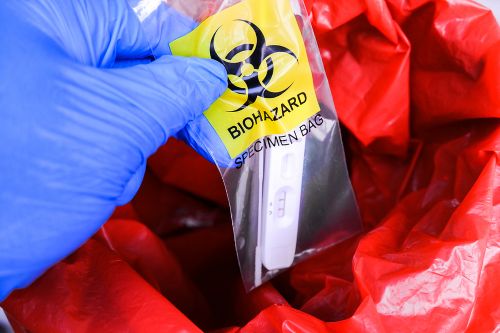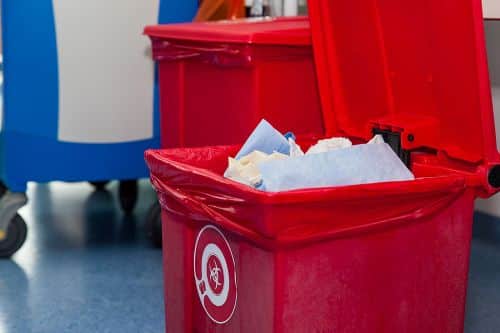Biomedical Waste Disposal Services
How Medical Waste Disposal Works
Safe. Compliant. Easy.
At All Points Medical Waste, we make proper medical waste disposal simple and stress-free. Following Florida’s regulatory standards, our step-by-step process helps you stay in full compliance while maintaining a safe environment for your staff and patients. Here’s how to properly handle your biohazard waste:
Step 1:
Setup & Labeling
 (Per Florida Administrative Code 64E-16)
(Per Florida Administrative Code 64E-16)
- Place your primary biohazard waste container in the immediate area where waste is generated—such as a treatment room or lab.
- Before use, line each container with a certified red biohazard bag.
- Clearly label every red bag with your facility’s name, address, and phone number to remain compliant with Florida state law.
Step 2:
Interim Storage & Bag Sealing

- Deposit all infectious or biohazardous waste into the red-lined container immediately after use.
- Continue filling the container until it reaches capacity or is ready to be removed.
- State guidelines allow for biomedical waste storage for no more than 30 days from the first date of deposit.
- Once full, tie off the biohazard bag using an approved method (gooseneck knot or equivalent).
- Remove the sealed bag and place it into a Regulated Medical Waste (RMW) container.
- Insert a new red liner into the original container and repeat the process.
Step 3:
Consolidation for Pickup
- On or before your scheduled service day, transfer sealed biohazard bags from treatment rooms or storage areas into the designated RMW containers.
- Replace filled sharps containers with fresh ones to maintain safety and OSHA compliance.
- RMW containers should hold both sharps containers and sealed biohazard bags for secure and consolidated disposal.
Step 4:
Pickup & Replacement by All Points Medical Waste

- On your scheduled pickup day, All Points Medical Waste will perform a seamless one-for-one exchange of your full RMW containers and deliver any requested supplies (new sharps containers, red bags, etc.).
- Any waste not placed into the RMW container prior to pickup may be added to your fresh container and collected during your next scheduled service.
Your Trusted Partner in Compliance
We’re here to help you stay compliant and protected with every pickup. All Points Medical Waste follows strict procedures to ensure your waste is managed in full accordance with Florida law. We’re not just your hauler—we’re your compliance partner.
Need help with setup or training? Ask us about our online compliance courses for OSHA, HIPAA, Bloodborne Pathogens, Sharps Safety, and more.
Items That Should Not Be Placed in a Biohazard Container
Proper segregation of waste is critical to maintaining a safe, compliant, and cost-effective disposal process. Not all waste generated in a healthcare or laboratory setting qualifies as biohazardous. The following items should not be placed in biohazard containers:
General Waste
Regular trash such as paper products, packaging materials, and uneaten food that are free from contamination should go in standard waste bins.
Recyclable Materials
Clean plastic bottles, cans, cardboard, and other recyclables belong in clearly marked recycling containers—not biohazard bins.
Chemical Waste
Hazardous chemicals, laboratory reagents, and pharmaceuticals require their own specialized containers and disposal protocols.
Radioactive Waste
Materials exposed to radioactive substances must be handled and disposed of through regulated radiation safety procedures.
Non-Contaminated Sharps
Unused needles and sharps that haven’t come into contact with infectious agents should be placed in designated sharps containers—not red bags.
Unused or Clean PPE
Gloves, masks, and gowns that have not been exposed to bodily fluids or infectious materials can typically be disposed of in regular waste, unless otherwise directed by your facility's protocols.
Correctly separating your waste not only helps your facility meet Florida compliance requirements but also reduces disposal costs and limits environmental impact. If you're ever unsure about the proper disposal route for any item, the team at All Points Medical Waste is here to help.
What Qualifies as Biohazard Waste?
Biohazardous waste—also called infectious or biomedical waste—is any material that may carry pathogens and pose a risk of infection to humans, animals, or the environment. This type of waste is commonly produced in healthcare, research, and veterinary settings.
To keep your facility safe and compliant, it's important to know what should be treated as biohazard waste:
Used Sharps
Includes needles, syringes, scalpel blades, and broken glass that have come into contact with bodily fluids.
Pathological Waste
Tissues, organs, and surgical specimens removed during medical procedures.
Blood-Contaminated Materials
Bandages, gauze, and dressings soaked with blood or bodily fluids.
Laboratory Waste
Cultures, stocks, and other microbiological materials from medical or research labs.
Animal Waste
Animal tissues, carcasses, and bedding from research animals exposed to infectious agents.
Used PPE
Gloves, gowns, face shields, and masks that have been used during patient care or lab procedures.
Correctly separating your waste not only helps your facility meet Florida compliance requirements but also reduces disposal costs and limits environmental impact. If you're ever unsure about the proper disposal route for any item, the team at All Points Medical Waste is here to help.



